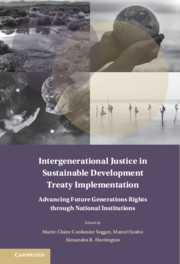 Intergenerational Justice in Sustainable Development Treaty Implementation
Intergenerational Justice in Sustainable Development Treaty Implementation Book contents
- Intergenerational Justice in Sustainable Development Treaty Implementation
- Treaty Implementation for Sustainable Development
- Intergenerational Justice in Sustainable Development Treaty Implementation
- Copyright page
- Contents
- Figures
- Tables
- Notes on Contributors
- Foreword
- Acknowledgements
- Abbreviations and Acronyms
- 1 Introduction
- 2 The Theoretical Framework for International Legal Principles of Intergenerational Equity and Implementation through National Institutions
- Part I Introduction to Treaty Law on Intergenerational Justice and Codifying Sustainability
- Part II Key Challenges in Domestic Implementation of Intergenerational Justice
- Part III Law and Policy Innovations for Intergenerational Justice
- Part IV Implementing Sustainability through National Institutions: Case Studies
- National Case Studies
- 18 Institutions for a Sustainable Future: The Former Israeli Commission for Future Generations
- 19 Norway: Norwegian Ombudsman for Children
- 20 Institutions for a Sustainable Future: The German Parliamentary Advisory Council on Sustainable Development
- 21 Power over Coming Generations: Committee for the Future in the Eduskunta, the Parliament of Finland
- 22 Welsh Commissioner for Sustainable Futures
- 23 Parliamentary Commissioner for the Environment, New Zealand
- 24 Canadian Commissioner of the Environment and Sustainable Development
- 25 Intergenerational Equity, Peace, and Transitional Justice in Colombia
- 26 Indigenous Peoples and Intergenerational Equity in Mexico
- 27 Legal Innovations for Intergenerational Justice in Sustainable Landscapes Management of Democratic Republic of Congo
- 28 Local Indigenous Planning Instruments for Intergenerational Equity in Ahousaht Traditional Territories of Canada
- Comparative Insights
- Part V Regional Trends in Intergenerational Justice
- Part VI Future Trends
- Afterword
- Table of Authorities
27 - Legal Innovations for Intergenerational Justice in Sustainable Landscapes Management of Democratic Republic of Congo
from National Case Studies
Published online by Cambridge University Press: 15 October 2021
- Intergenerational Justice in Sustainable Development Treaty Implementation
- Treaty Implementation for Sustainable Development
- Intergenerational Justice in Sustainable Development Treaty Implementation
- Copyright page
- Contents
- Figures
- Tables
- Notes on Contributors
- Foreword
- Acknowledgements
- Abbreviations and Acronyms
- 1 Introduction
- 2 The Theoretical Framework for International Legal Principles of Intergenerational Equity and Implementation through National Institutions
- Part I Introduction to Treaty Law on Intergenerational Justice and Codifying Sustainability
- Part II Key Challenges in Domestic Implementation of Intergenerational Justice
- Part III Law and Policy Innovations for Intergenerational Justice
- Part IV Implementing Sustainability through National Institutions: Case Studies
- National Case Studies
- 18 Institutions for a Sustainable Future: The Former Israeli Commission for Future Generations
- 19 Norway: Norwegian Ombudsman for Children
- 20 Institutions for a Sustainable Future: The German Parliamentary Advisory Council on Sustainable Development
- 21 Power over Coming Generations: Committee for the Future in the Eduskunta, the Parliament of Finland
- 22 Welsh Commissioner for Sustainable Futures
- 23 Parliamentary Commissioner for the Environment, New Zealand
- 24 Canadian Commissioner of the Environment and Sustainable Development
- 25 Intergenerational Equity, Peace, and Transitional Justice in Colombia
- 26 Indigenous Peoples and Intergenerational Equity in Mexico
- 27 Legal Innovations for Intergenerational Justice in Sustainable Landscapes Management of Democratic Republic of Congo
- 28 Local Indigenous Planning Instruments for Intergenerational Equity in Ahousaht Traditional Territories of Canada
- Comparative Insights
- Part V Regional Trends in Intergenerational Justice
- Part VI Future Trends
- Afterword
- Table of Authorities
Summary
The purpose of this chapter is to examine the importance of traditional knowledge (TK) and genetic resources to Indigenous and local communities (ILCs). In the next pages is a broader explanation of the value of TK and genetic resources, as well as examples of industries that depend on access to genetic resources and TK. This chapter will also provide an examination of the threats to access to genetic resources and TK on the part of ILCs, tracing the development of international property rights (IPRs) in this domain. Moreover, there is a survey of the international regimes relating to the protection of TK and access to genetic resources, studying treaties and other international instruments. Incompatibilities can sometimes be observed between IPRs and TK, as well as gaps in the current protections and regimes in place, which will also be examined in this chapter. Finally, the chapter will present case studies in Africa and South America relating to TK and the economic development of ILCs, particularly in the area of agroecology.
- Type
- Chapter
- Information
- Intergenerational Justice in Sustainable Development Treaty ImplementationAdvancing Future Generations Rights through National Institutions, pp. 508 - 527Publisher: Cambridge University PressPrint publication year: 2021


